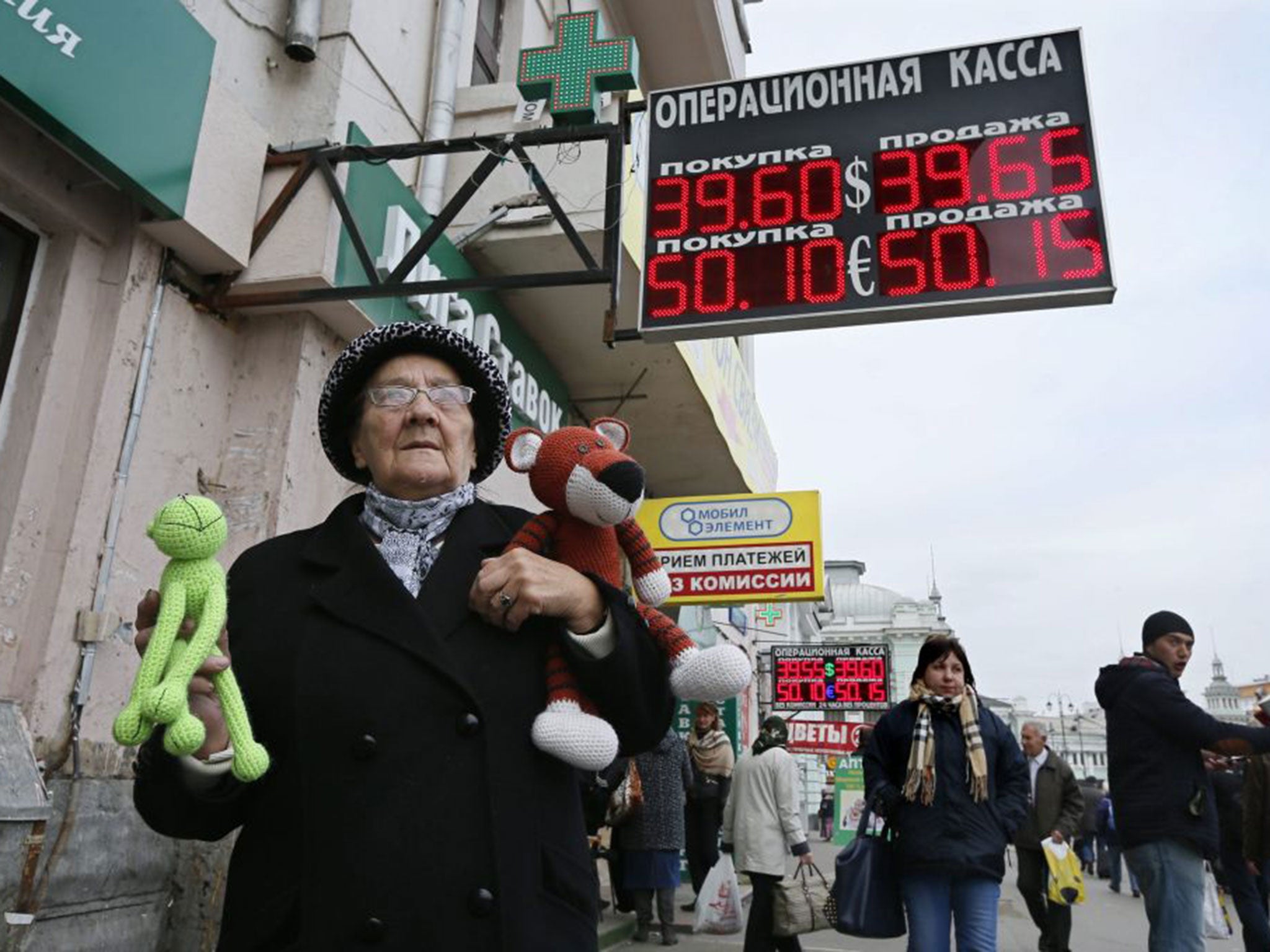Investors abandon Russia as Putin risks economy for Crimea
Economic sanctions are biting in Russia but President Putin is showing little sign of softening his approach to the West, while at home tougher state controls have led to the arrest of another member of the business elite

Deep into the worst conflict between Russia and the West since the Cold War, investors are fleeing, food prices are soaring and there are rumbles from Russia’s Westernised business elite that the nation needs to avoid repeating the economic mismanagement that broke apart the Soviet Union.
Western sanctions have choked off financing to some of Russia’s economic juggernauts and denied crucial technology to the nation’s energy sector.
But there is little evidence that the mounting economic pressures since the March annexation of Ukraine’s Crimean peninsula will soften Russian President Vladimir Putin’s policies toward Ukraine and other nations in the former Soviet orbit.
Mr Putin still enjoys sky-high approval ratings, and ordinary Russians say they are ready to make sacrifices in a battle with the West.
Because of economic warfare with Europe, meat and vegetable prices have risen dramatically. Travel abroad has dropped so swiftly that dozens of tour operators were bankrupted this summer, leaving some tourists stranded in Turkey and Egypt. Portions of Russian savers’ pension funds have been appropriated by the state to prop up its companies.
Russia has been sliding into economic stagnation, with analysts estimating only meagre growth in 2014 and a recession that may have begun in the year’s final quarter. Oil prices, which underpin key assumptions of Russia’s budget, are falling. Investors pulled almost $75bn (£46.6bn) out of the country in the first six months of the year alone.
The rouble is down 20 per cent since the beginning of the year, and it slid to new lows this week. Russia’s central bank spent at least $3bn this month to slow the rouble’s decline, depleting the nation’s still-mighty foreign currency reserves.
The fears of Russia’s wealthy elite have been heightened following the mid-September house arrest of one of their own, Vladimir Yevtushenkov, on charges of money laundering. Associates say the detention is a signal that one of the central tenets of the Putin era has come to an end: that corporate titans would be free to make vast sums of money so long as they steered clear of politics. Mr Yevtushenkov adhered to the bargain, but his refusal to give up his stake in a profitable oil company, Bashneft, may have made him a target. Even Russia’s Economy Minister said the arrest would deal a blow to his nation’s business climate. The Soviet Union broke up because of “the mind-boggling incompetence of the Soviet leadership. They did not respect the laws of economic development,” Sberbank chief executive German Gref said at an economic conference in Moscow this month. Sberbank, Russia’s largest bank, has been targeted with sanctions. “It is very important for us to learn the lessons of our own history,” Mr Gref said.
Mr Putin has sought to downplay the concerns, but policymakers are discussing pruning back the list of spending commitments he made when he took back the presidency in 2012.
“We have always strived to have Russia develop as an open-market economy and will continue to do so. This strategic course remains unchanged,” Mr Putin said at the same conference.
Some of Mr Putin’s hawkish security advisers – a group made of former associates from his years in the KGB and in St Petersburg have spoken of putting Russia’s economy on a footing where the needs of the state come before the needs of businesses and individuals. This would help them marshal the resources necessary for a confrontation with the West.
That is the fear of some Russian businesspeople watching the case of Mr Yevtushenkov, whom Forbes ranked as Russia’s 15th-richest billionaire. He is the wealthiest Russian targeted by the state since the 2003 arrest of Mikhail Khodorkovsky, who had funded the political opposition here.
Mr Yevtushenkov studiously avoided politics, but his Sistema holding company had a stake in Bashneft, a regional oil powerhouse that has appeared to be a takeover target by state-owned companies.
Mr Yevtushenkov’s detention has been publicly challenged by some of Russia’s mightiest tycoons.
“I have always been against all kinds of conspiracy theories, but you can make a lot of this case,” Russian Economy Minister Alexei Ulyukayev said after the arrest, Interfax reported. The house arrest “is negatively impacting our investment climate, which is very bad as it is,” he said.
“It is in many ways more painful than Yukos, because people could say that, well, Khodorkovsky was doing things he shouldn’t do,” said one economics expert. “But Yevtushenkov was doing everything right.”
Some analysts say that the new economic realities may force Putin to moderate his stance on Ukraine, the key driving aspect of the broader conflict with the West.
“Putin’s rhetoric is becoming softer, much softer than it was three or four months ago,” said Vladimir Ryzhkov, a former opposition lawmaker. “The economy, it’s the main thing that’s happening now in Russia. And economic problems are growing very fast.”
Sergei Guriev, an economist at the Paris university Sciences Po, said that Russia’s attractiveness to foreign investors would be permanently damaged. “Investors have learned that, for Mr Putin, economic growth is not a priority,” he said. “If he has to choose between growth and Crimea, he will choose Crimea.”
© The Washington Post
Join our commenting forum
Join thought-provoking conversations, follow other Independent readers and see their replies
Comments